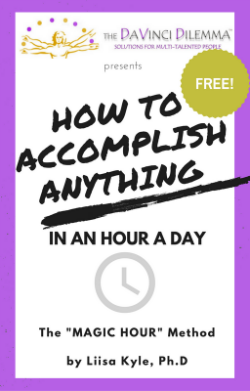Wait…isn’t talking about your talents and goals with others a good thing? Doesn’t it make you more accountable, and more likely to achieve your dream than if you keep it to yourself?
Maybe. Maybe not. I recently ran across this short video from a TEDtalks speech by Derek Sivers. In it he makes the argument that sharing your goals with others makes you less likely to achieve them, because the acknowledgment you receive from others tricks your brain into feeling as if you’ve already accomplished something, when in fact the hard work is still ahead of you. Here is the three minute video; read on below for the rest of this article.
Actually, there are a slew of extra pitfalls to discussing your goals if you’re a multi-talented person, known in this space as a DaVinci. I don’t know about you, but whenever I bring up a new creative project or business idea to some of the people who know me, I tend to get a lot of rolling eyes, smirks and shaking heads. It not really necessary to ask what these folks are thinking. Really, Lisa? ANOTHER new idea? What about the last five gazillion other things you were so excited about last week/last year/during the 20th Century? To them, my sharing a goal is the creative equivalent of crying wolf. They don’t mean to be unsupportive, they’ve just seen too many of my dreams get shelved or forgotten, and they don’t want to (a) feel like fools for getting excited about something that may not happen or (b) enable me in taking on something new when my plate is already so full.
And if I’m talking to my biggest fans, I’ll admit to falling prey to the phenomenon Sivers describes in his video. The support and acknowledgment feels great in the moment, so it’s like having dessert first. Now I feel like staying there in that post-chocolate cake haze, and now the lima beans –the actual work involved to bring the goal to fruition –are even less attractive than they would have been otherwise. If you’re someone like me who likes applause, this is a real problem. When I pitch a screenplay idea to an appreciative audience, I feel like I’ve already gotten a Best Screenplay Oscar for the movie — and I still haven’t typed FADE IN: on the script. This is besides the fact that now I feel like much of my creative energy is already spent. But instead of channeling it and pouring it onto the page, I’ve spilled it all out of my mouth…and now those 110 blank pages seem like they reach to the moon.
Sivers says that the way to circumvent this is to tell no one your goals. While this would probably work in a blunt-instrument sort of way, I think there is a better, more nuanced approach for DaVincis.
- Decide on a real goal. For DaVincis, this is a project in itself, and there are a number of great articles here to help you. My point here is to distinguish between a fun idea that excites you right now and something you REALLY want to accomplish. It’s ok to have a lot of ideas, and to enjoy discussing your latest, as a fun topic of conversation or creative calisthenics. Just don’t confuse it with a real goal if all you’re really doing is blue-skying, at the risk of disappointing yourself and others. Also, depending on the sweat involved, choosing to pursue a goal probably means not choosing something else, at least for right now. Make sure you are OK with that before proceeding to step 2.
- Decide strategically whom to tell. The naysayers will only stomp on your fledgling idea and bring up all the reasons why it’s too risky, will never work, and how it’s doomed to join the pile of all the other things you never finished. Is there really ever any reason to share any of your dreams with these people? The cheerleaders may make you feel too good too soon, and inadvertently take the wind out of your sails. What you need here is one or several accountability partners who will support you in your goal but not let you get sidetracked or too comfortable if you’re not making progress. Hiring a coach is ideal. This is the one person who is committed to your achieving your goal and has no vested interest (like worrying if you’ll stay friends) in letting you off the hook. A coach is also a trained professional who can give you tools and help you implement strategies to help with planning projects, help you reward and enjoy yourself along the way in ways that won’t slow you down, and make taking the incremental steps along the path to your goal clearer and easier. A mastermind group of like-minded people is another choice to use in conjunction with a coach or alone. The trick here –especially if you are already friends with the people in your group — is not to enable each other in unhelpful, lazy or counterproductive behaviors (like joining a gym together and then heading off to IHOP after your workouts). Writers know that being in a writers’ group is a great way to have support and accountability for your writing goals from people who truly understand. Your group doesn’t all have to have the same goal (such as writing a screenplay) in order to provide that support and accountability to each other. If forming and facilitating such a group yourself is daunting to you, there are coaches who run masterminds and take care to place like-minded people together.
- Come up with a line for the people “out of the loop.” Invariably, the people you have chosen not to share your goal with will ask you what you are doing or working on these days. Now is the time to be prepared with something to say –anything, really — that will keep you from going against your better judgment and spilling the beans to the wrong folks. Remember that many of these folks don’t really care what you say. They are a.) just making conversation or b.) testing to see if you are indeed following yet another rabbit trail so they can pass judgment on your scatteredness. Have a line ready. Unless the person asking is your priest or your mother, it’s fine if it’s a partial truth or even a total lie. “Oh, I’ve gotten several new clients and I’m planning a trip to Bali. How about you?” They really do not need to know the part about how you’ve invested a chunk of your life savings in a great new business venture you thought up. (Actually, on second thought, lying to your mother is probably a good idea.)
Activity: Choose any goal, business, creative or personal, from your list just for the purpose of this exercise.
- Ask yourself, before saying anything to anyone — would telling people help or hurt? Who would discourage you? Who would praise you? Would the praise lessen your drive?
- Now, pick your best possible accountability team. It could be a coach, a mastermind group, a friend with a similar goal, or a combination. The point is to pick who you think would be most effective in keeping you focused, motivated and moving forward. (It’s not necessarily your best friend or your spouse!)
- Finally, come up with your “story” for the people you don’t share with. Make it something short and simple that you can rattle off without stress or guilt. Maybe have fun and make it a little creative. Only you will know how much of it is really true. End with a question turning it around and getting the focus off of you. “So what about you, what are you up to?”
What do you think? Is it better to share your goals or keep them to yourself? Please weigh in on this topic below. If you have a blog, a link to your latest post will show in your comment!
If you’d like to share or publish this article, you may, if you include the author’s name, a link to this original post and the following text blurb:
Are you struggling with too many talents, skills, ideas? You may have The DaVinci Dilemma™! Find tools, fun quizzes, coaching, inspiration and solutions for multi-talented people at http://www.davincidilemma.com/ .




Thanks so much for sharing this! I can honestly say that this may be the most important thing I’ve ever learned about goals.I’ve experienced exactly what this speaker talked about, so it makes SO much sense! I’m in the middle of some transition, and setting new goals, so this comes at the perfect time!
Love this- you sound like me Lisa xo
Shakaya
earthempress.com